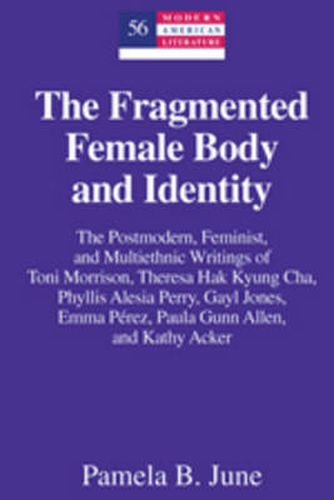Readings Newsletter
Become a Readings Member to make your shopping experience even easier.
Sign in or sign up for free!
You’re not far away from qualifying for FREE standard shipping within Australia
You’ve qualified for FREE standard shipping within Australia
The cart is loading…






This title is printed to order. This book may have been self-published. If so, we cannot guarantee the quality of the content. In the main most books will have gone through the editing process however some may not. We therefore suggest that you be aware of this before ordering this book. If in doubt check either the author or publisher’s details as we are unable to accept any returns unless they are faulty. Please contact us if you have any questions.
The Fragmented Female Body and Identity explores the symbol of the wounded and scarred female body in selected postmodern, multiethnic American women’s novels, namely Toni Morrison’s Beloved, Theresa Hak Kyung Cha’s Dictee, Phyllis Alesia Perry’s Stigmata, Gayl Jones’s Corregidora, Emma Perez’s Gulf Dreams, Paula Gunn Allen’s The Woman Who Owned the Shadows, and Kathy Acker’s Blood and Guts in High School and Empire of the Senseless. In each of these novels, disjointed, postmodern writing reflects the novel’s focus on fragmented female bodies. The wounded and scarred body emerges from various, often intersecting, forms of oppression, including patriarchy, racism, and heteronormativity. This book emphasizes the different and nuanced forms of oppression each woman faces. However, while the fragmented body symbolizes oppression and pain, it also catalyzes resistance through recognition. When female characters recognize some element of a shared oppression, they form bonds with one another. These feminist unities, as a response to multiple forms of oppression, become viable means for resistance and healing.
$9.00 standard shipping within Australia
FREE standard shipping within Australia for orders over $100.00
Express & International shipping calculated at checkout
This title is printed to order. This book may have been self-published. If so, we cannot guarantee the quality of the content. In the main most books will have gone through the editing process however some may not. We therefore suggest that you be aware of this before ordering this book. If in doubt check either the author or publisher’s details as we are unable to accept any returns unless they are faulty. Please contact us if you have any questions.
The Fragmented Female Body and Identity explores the symbol of the wounded and scarred female body in selected postmodern, multiethnic American women’s novels, namely Toni Morrison’s Beloved, Theresa Hak Kyung Cha’s Dictee, Phyllis Alesia Perry’s Stigmata, Gayl Jones’s Corregidora, Emma Perez’s Gulf Dreams, Paula Gunn Allen’s The Woman Who Owned the Shadows, and Kathy Acker’s Blood and Guts in High School and Empire of the Senseless. In each of these novels, disjointed, postmodern writing reflects the novel’s focus on fragmented female bodies. The wounded and scarred body emerges from various, often intersecting, forms of oppression, including patriarchy, racism, and heteronormativity. This book emphasizes the different and nuanced forms of oppression each woman faces. However, while the fragmented body symbolizes oppression and pain, it also catalyzes resistance through recognition. When female characters recognize some element of a shared oppression, they form bonds with one another. These feminist unities, as a response to multiple forms of oppression, become viable means for resistance and healing.